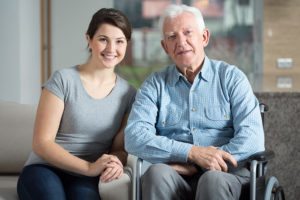
Getting the call that your parent has had a heart attack and is in the hospital is probably one of the worst experiences a child can imagine. The good news is, your parent survived. Now you are faced with the care that they will need depending on the physical limitations they present with. In many cases, with time, your parent will feel better than they have in a long time. They were unaware that their arteries were filling with plaque and that the blood and oxygen flowing to and from the heart were restricted. Suddenly, they are receiving more oxygen. It does, however, take time to recover.
Symptoms
Following a heart attack, the following symptoms are normal:
- Returning to normal, everyday activities is going to take some time. It’s best for your parent to take it slow upon their return home and work up to increased levels of activity. Their primary health care provider will be able to let you know just how much exercise and activity they should be doing. Just performing the daily tasks such as bathing and dressing can feel exhausting. Space their activities throughout the day and be there for them should they need assistance. If you are unable to be there physically, consider obtaining the assistance of an elder care provider.
- Twenty percent of those people age 45 and older who have one heart attack will experience a second one. With this statistic in mind, it’s easy for your parent to be fearful of a second attack occurring. Their fears may be so profound that they limit their daily activity. Unfortunately, this approach does more harm than good.
How to Help
Consider having your parent participate in a cardiac rehabilitation program. This is a medically supervised program that the American Heart Association claims is a “very important step in your recovery.” If for any reason their cardiologist did not recommend one, contact them to request cardiac rehabilitation or find out why they are not suggesting this important program.
Help your parent avoid a second heart attack by following these guidelines suggested by the American Heart Association:
- Manage their risk factors such as high blood pressure, high cholesterol and diabetes. This involves keeping their blood sugar, blood pressure and blood cholesterol levels all within the normal range. Ideally, this is accomplished through diet and exercise. If they are having trouble making the necessary lifestyle changes or their body is not responding, their primary health care provider may place them on medication. If they do, it’s important to ensure that they take the recommended dose at the suggested time.
- Connect with others who have gone through the same thing. Only someone who has had a heart attack can relate to the feelings of fear and insecurity. Help your parent join a support group in order to acknowledge and understand their feelings and obtain information regarding what has worked for those going through similar situations.
Elder Care Provider
Your parent will require some assistance upon their return home. Consider obtaining the services of an elder care provider who can assist with daily tasks while allowing them to slowly regain their strength and stamina.
If you or an aging loved one needs elder care in Sacramento, CA, remember Senior Home Care Services. Call us at (916) 514-7006 for more information.
Resources
http://www.heart.org/HEARTORG/Conditions/HeartAttack/LifeAfteraHeartAttack/Life-After-a-Heart-Attack_UCM_487069_Article.jsp#.WSH7BOvytpg
http://www.heart.org/HEARTORG/Conditions/More/CardiacRehab/Cardiac-Rehab_UCM_002079_SubHomePage.jsp
- Kitchen Tools That Make Eating Easier for Seniors - April 25, 2025
- Helping Seniors Reduce Health Anxiety - April 18, 2025
- Why Should Seniors Consider Adding Soy to Their Diets? - April 7, 2025


